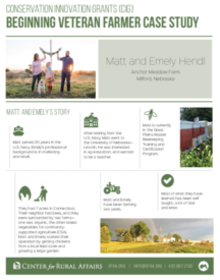- Matt served 20 years in the U.S. Navy. Emely’s professional background is in marketing and retail.
- After retiring from the U.S. Navy, Matt went to the University of Nebraska—Lincoln. He was interested in ag education, and wanted to be a teacher.
- Matt is currently in the Great Plains Master Beekeeping Training and Certification Program.
- They had 7 acres in Connecticut. Their neighbor had bees, and they were surrounded by two farms—one was organic, the other raised vegetables for community-supported agriculture (CSA). Matt and Emely started their operation by getting chickens from a local feed store and growing a large garden.
- Matt and Emely have been farming two years.
- Most of what they have learned has been self taught, a lot of trial and error.
Mentor
Del Ficke, of Ficke Cattle Company, has served as a mentor for Matt and Emely. He hosts bees on his land, and grazes Matt’s and Emely’s chickens.
"Del has been an invaluable resource—he has shared his experience and knowledge with us."
Advice for beginning farmers
“Don’t be afraid to ask for help. Have a backup plan. Be able to transition your mindset to ‘plan B.’ You’re going to start small and feel overwhelmed, but don’t give up.”
Operation
They have 5 acres which host free-range, pasture-raised chickens, 17 head of Kunekune hogs, and honey bees. Their 11 bee hives are at three different locations.
"Diversify commodities and how you market your goods. For example, we can use our bees for honey, pollinating, or we can sell them. Our chickens lay eggs, can be sold for meat or as layers, and help with insect mitigation."
Conservation
"Conservation is important. We care about where our food comes from, for our health. We care about the quality of life of our animals. We care about sustainable agriculture. On our farm, we supplement our hogs’ diets with butternut squash from our garden. We don’t rob honey from our hives, we let the honey supply build up (which means we have to be patient). This helps keep our hives healthy."
Read more about Matt and Emely on our blog by clicking here.
This material is based upon work supported by the Natural Resources Conservation Service, U.S. Department of Agriculture, under number 69-3A75-17-46. Any opinions, findings, conclusions, or recommendations expressed in this publication are those of the author(s) and do not necessarily reflect the views of the USDA. USDA is an equal opportunity provider and employer.


